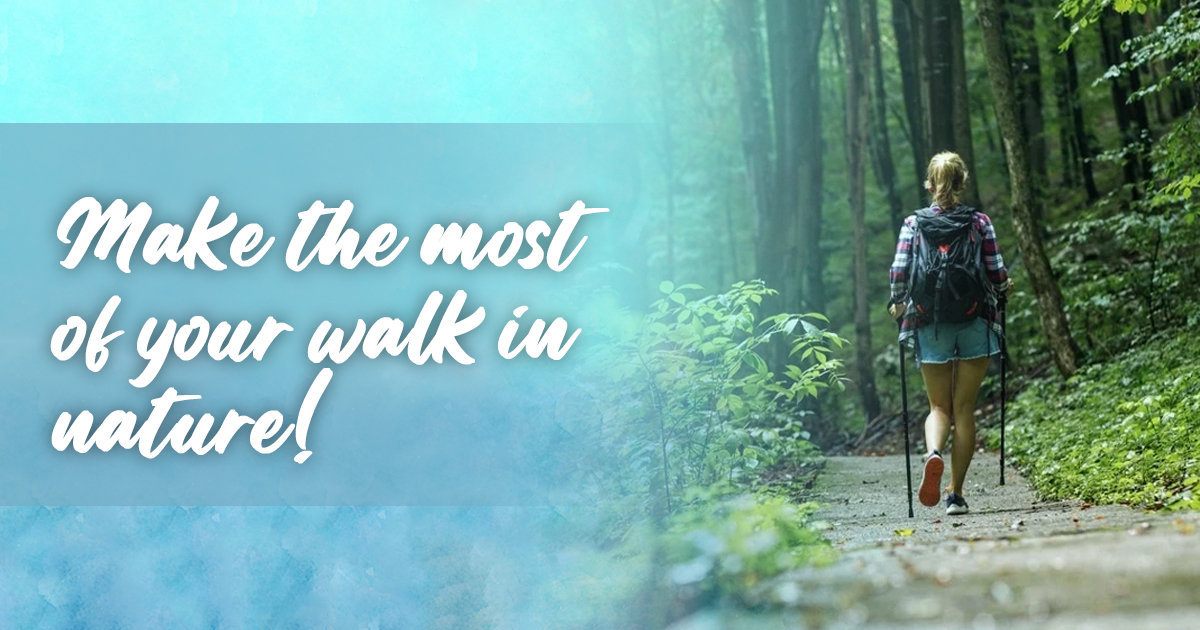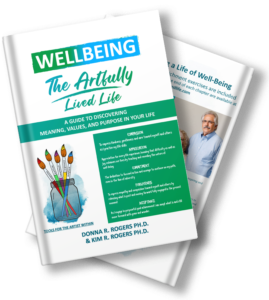Make the most of your walk in nature
Although walking in nature has been shown to have a greater benefit than walking in an urban environment, bringing mindfulness into the process may increase your sense of well-being wherever you walk. One of the pillars of mindfulness is present moment awareness through our senses. For example, what do you see? Are you in a forest, beach, perhaps tree-lined neighborhood or a more urban environment. What does the path or pavement feel like under your feet, is it smooth or uneven? Is it level or inclined? What happens to your breathing rate as you walk? Are you walking on the sidewalk or a forest path? What do you hear? Perhaps you can hear the chirping of songbirds or a gaggle of geese on a nearby pond. If you are in a neighborhood, perhaps you hear the traffic from cars, trucks, trains or a plane overhead. What do you smell? Pine trees or the earthy forest floor. Perhaps flowers, someone cooking or just the car exhaust. Whatever it is, it is part of your present moment awareness. What do feel on your skin, is it warm, cold, dry or humid. With respect to your mindfulness practice, coming back to your senses yields many benefits, particularly when your mind begins to wander to your to-do list or many other worries and fears that we all face in our everyday lives. Can you bring your mind back to the present moment?
Perhaps you might consider one of the pillars of mindfulness.
These include Gratitude, Impermanence, Non-judgment, Compassion, Acceptance, and Non-doing.
Gratitude: When you look around and engage your senses can you feel gratitude for all that your senses bring to you – the earth below your feet, the sky, the trees, birds? This perspective will shift our focus from what we don’t have to what we do have. A small effort toward appreciation on our mindful walk can have a profound effect on our everyday life if we extend our gratitude to other aspects of our life such as our relationships, our homes, our food, drink and the very air that we are breathing.
Impermanence: Another mindfulness concept that we might contemplate during our walk might be impermanence. When you think about it the only thing that is constant is change. We can be certain that circumstances will change as we move through life. This realization may seem difficult if we are accustomed to clinging to times of happiness. When we realize the impermanence of our experience, we might better value and enjoy our happiness in the moment. We may also, at times, find ourselves dwelling on regrets from our past or worries about the future. When worried or regretful thoughts seem to surround us from all sides, we can acknowledge them, face them directly and work through what we can change and let go of the rest. By doing this, we may find that these thoughts and feelings become more transient. It can be a very freeing experience to realize that we can choose not to re-engage with painful thoughts and feelings.
Non-judgment: Our walk in nature is a great place to practice non-judgement. When we pass a pine tree, an oak or a beach tree, it is usually not in our nature to think that a particular tree, flower or plant is more worthy of our admiration than another. Nevertheless, we all seem to have the tendency to negatively judge ourselves (especially ourselves), others or the situations we are in. Non-judgment does not necessarily mean that we abandon our preferences, values, or moral compass. It does, however, mean that we can learn to accept ourselves, others and our present circumstances for what they are rather than our expectations of what we think they should be. We can continue to grow while accepting ourselves as who we are and others for who they are in the present moment.
Compassion has been described as empathy in action, that is we feel empathy and act through our compassion. Compassion has been shown to have a positive impact on reducing stress and improving relationships. It has also been linked to improved mental health, physical health, well-being, and longevity. Compassion is typically something we think of as extending to others. Compassion for ourselves, however, can be even more powerful. Through the practice of compassion for ourselves, we can gain the same benefits as compassion for others as well as reducing negative self-talk and increasing our sense of well-being.
Acceptance: Another pillar of mindfulness that might provide a focus for our walking experience is acceptance of life events as we experience them. This includes accepting your imperfections and mistakes as you engage in activities and pursue goals that give your life meaning and purpose. In addition to acceptance of yourself as you are in this moment, this mindful process includes accepting others as they are. This does not necessarily mean that we must approve of or even like what others do or the situations we find ourselves in. However, it can be an incredibly freeing experience to acknowledge the reality of things as they are and realize that we cannot change others to meet our expectations.
In conclusion, Mindfulness is one of a constellation of healthy lifestyle behaviors such as sleep, exercise, caring and stable relationships, diet, reduced or eliminated nicotine and alcohol that when practiced together have been shown to increase longevity, quality of life, and improve psychological and physical well-being. More specifically, clinical studies show that a mindfulness practice results in the reduction of stress and anxiety, improved emotional regulation, enhanced self-insight, greater ethical behavior, and increased immune system function. You might be thinking to yourself, at this point, nice to know, but how can I do all that stuff when I am, at present, just hanging on to life by my fingernails.
By contemplating mindfulness practices in your daily walks, you may not be able transform your entire lifestyle at once and reap the benefits shown by clinical research. Nevertheless, you will improve your walking experience and may feel motivated to take on one or more healthy changes in your present lifestyle.
Where can I get additional information on improving well-being?
“WellBeing: The Artfully Lived Life,” is a complete guide to psychological well-being; a holistic concept, encompassing all aspects of our lives. This book offers a wealth of insights and practical advice for practicing mindfulness, fostering meaningful relationships and engaging in thinking and behavior that brings joy and fulfilment in your life. Taking small steps each day can lead to transformative changes in your well-being, ultimately leading to a more balanced and artful existence.


